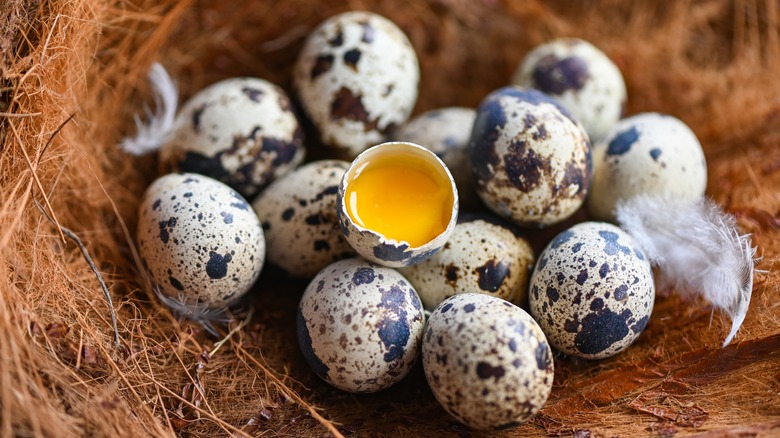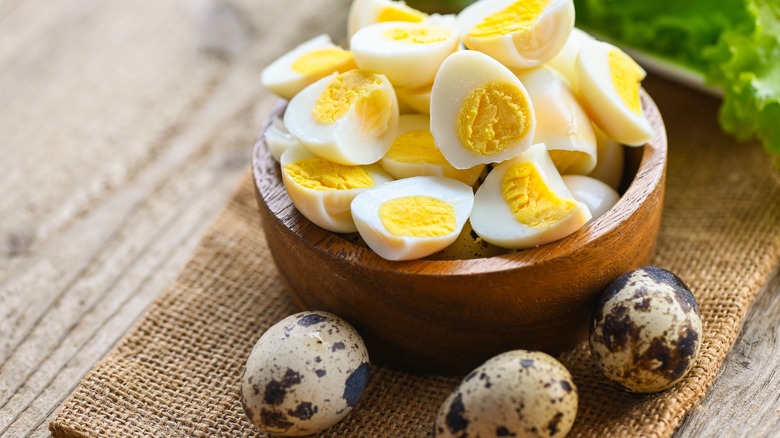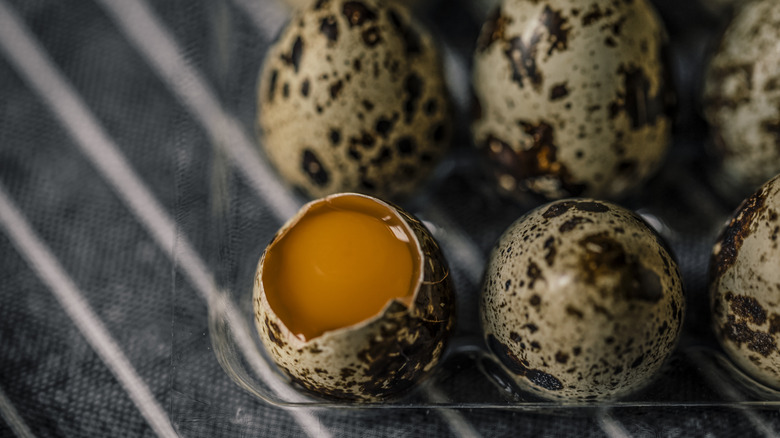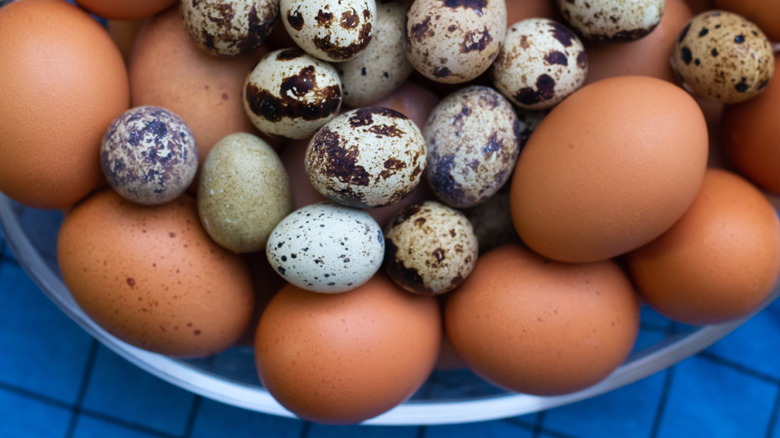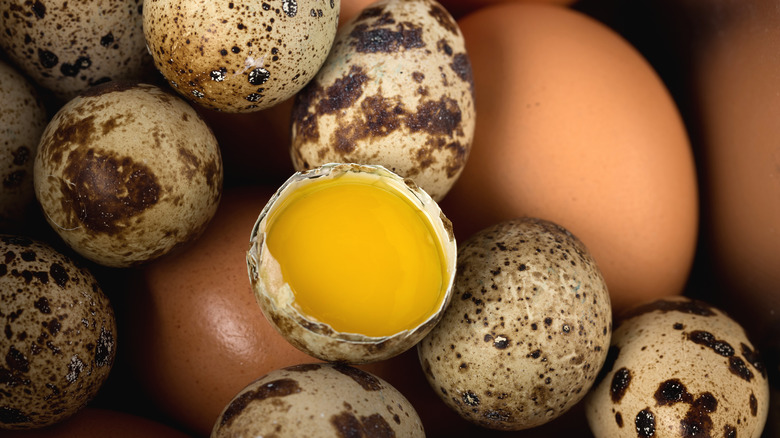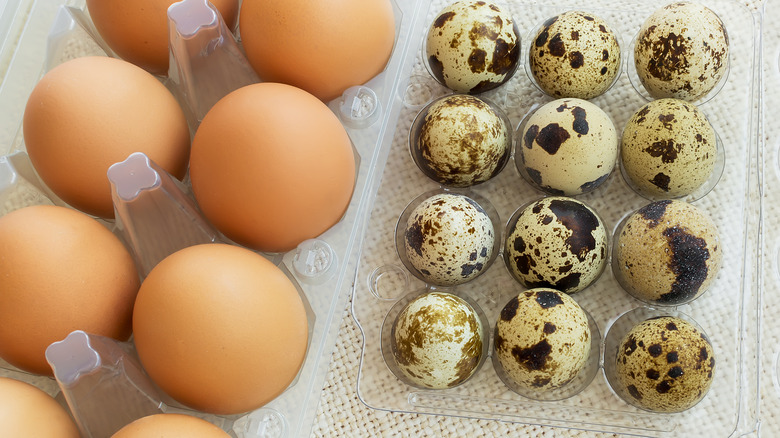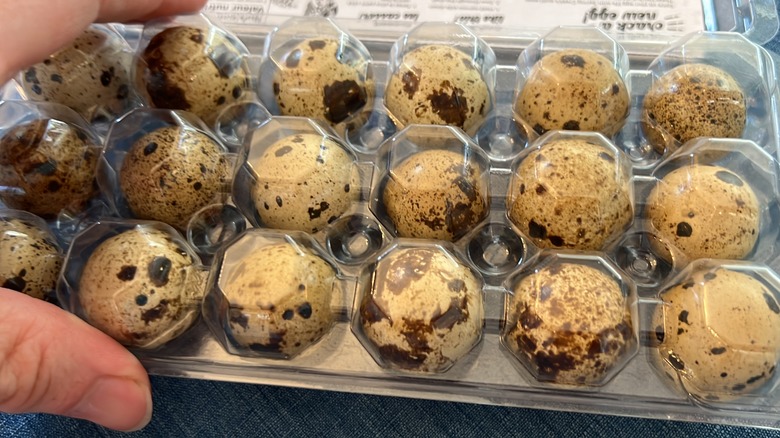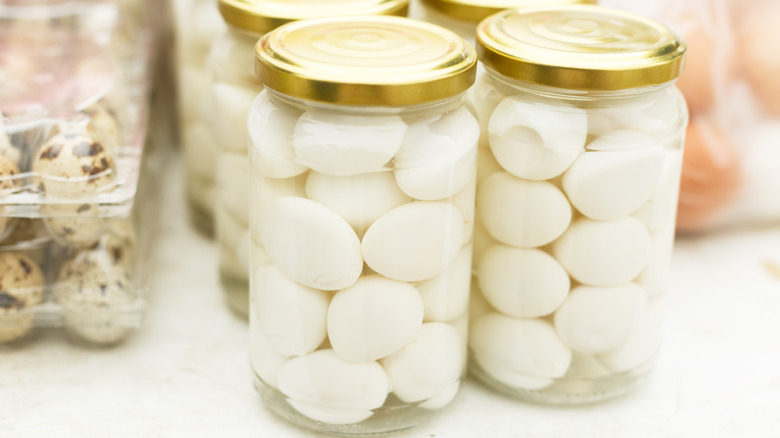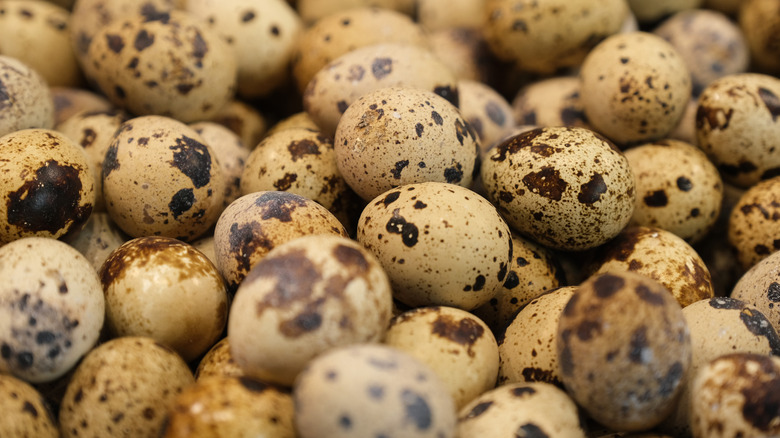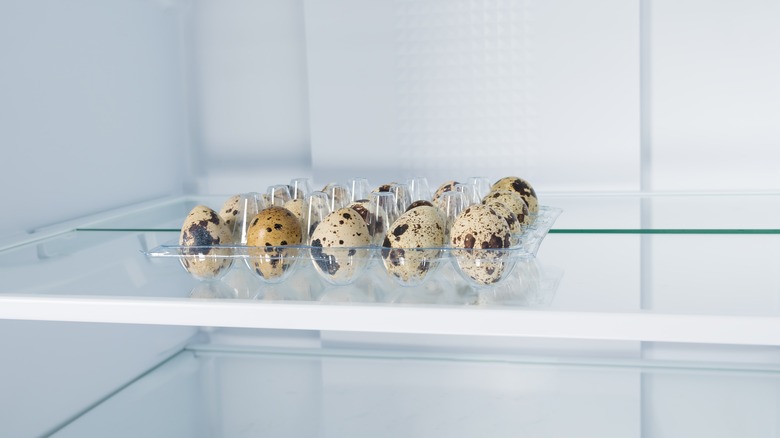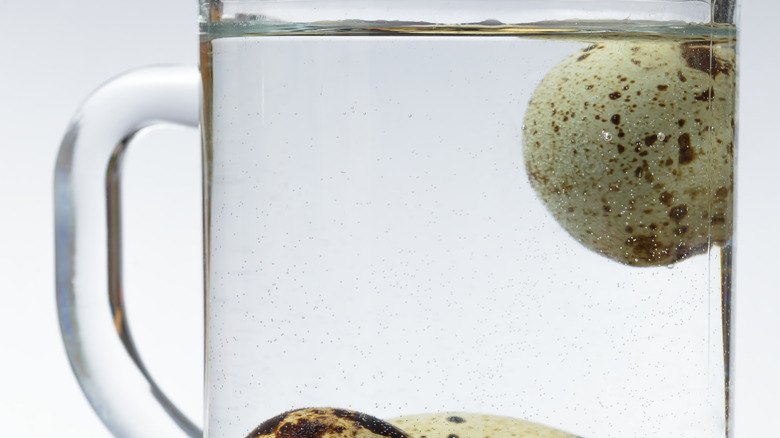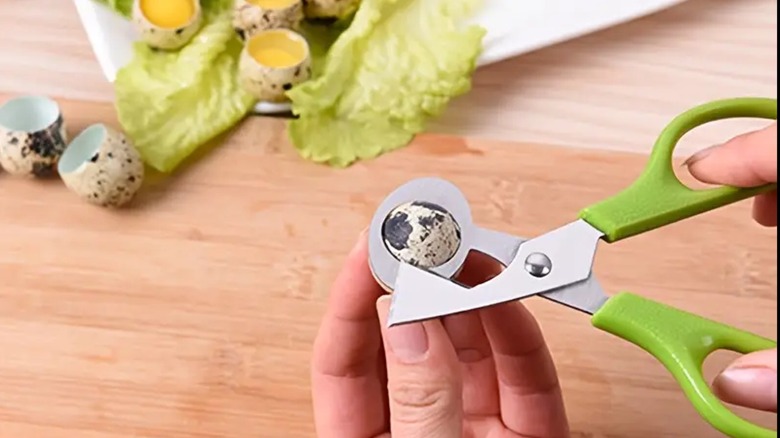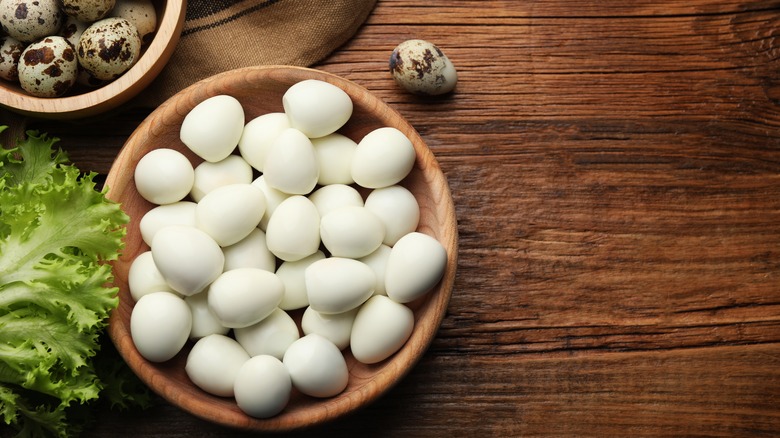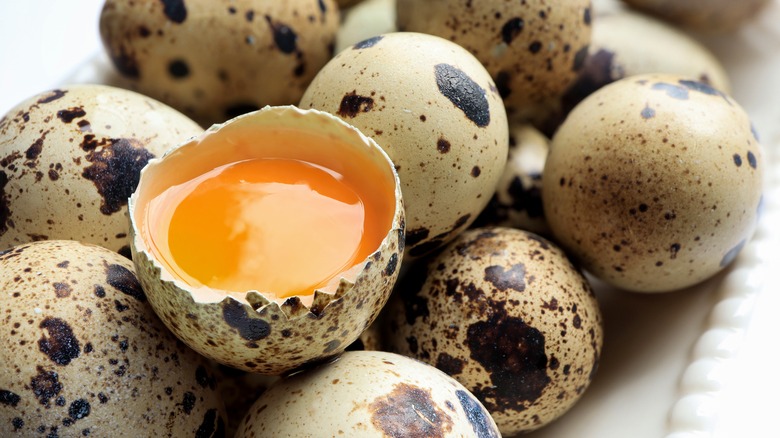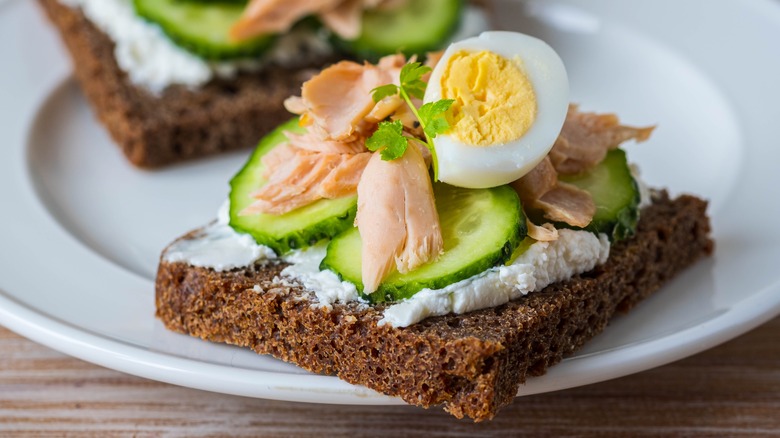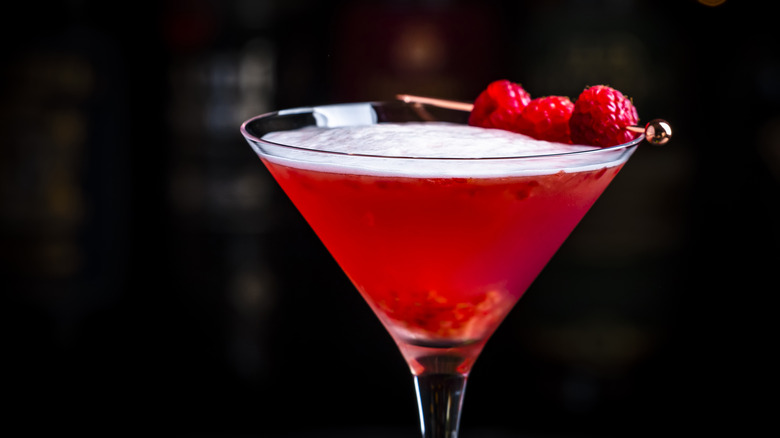The Ultimate Guide To Buying And Eating Quail Eggs
We may receive a commission on purchases made from links.
For those of you curious about adding quail eggs to your diet or trying them for the first time, there's a lot you need to know about buying and eating them. Once you encounter these cute but fragile little eggs, you'll want to give them a try. However, their differences from chicken eggs and all the other types of eggs out there mean there's a lot to know. Once you understand their shells, texture, and content a little more, you'll know better what to do with them once purchased.
We've explored quail eggs from a variety of angles for you, including their taste, health benefits, uses, price, and where to find them. In creating our quail egg guide, we consulted Bob White, the co-owner of Broome County Quail in Endicott, New York. He was able to give us valuable first-hand information about buying and eating quail eggs from his experience with raising quail and selling their eggs. So next time you encounter quail eggs, this guide will help you make the most of your experience.
What quail eggs taste like
If you've never had quail eggs before, you're probably wondering what they taste like. Hopefully, you won't be disappointed to learn they're like eating a smaller version of chicken eggs. However, there are a few differences.
Because they're yolk-heavy, they have a richer, more yolky flavor than chicken eggs. White tells us, "They definitely have more yolk proportionally, but if you use them as fried or scrambled eggs, you really don't notice a difference other than the size." Other people describe them as tasting similar to chicken eggs, but better. Of course, the higher quality taste might correlate to getting farm-fresh eggs, which we've always found to be better than commercially produced store-bought eggs. Some people have described them as being creamier as well, which likely relates to the yolk proportion. In this regard, they have similarities to duck eggs. (Speaking of, try baking with duck eggs for fluffier results!)
Quail eggs have more health benefits than you might expect
With quail eggs tasting similar to chicken eggs, you might be wondering just what is the big deal about them. The draw comes not only from their cute, delicate size but also from their nutritional content.
One tiny quail egg is just 14 calories, but it provides 2% of the daily value for folate, vitamin A, iron, and phosphorus; 3% of pantothenic acid; 4% of choline (an antioxidant); 5% of selenium; and 6% of riboflavin and vitamin B12 (via Healthline). Each egg has a gram of protein, which multiplies exponentially with each one you eat. There's also a single gram of fat in each egg, but 60% of that fat is the good kind — monounsaturated and polyunsaturated fat. Together, these nutrients can boost immunity, maintain a healthy thyroid, get your cholesterol heading in the right direction, increase energy and metabolism, and help organs function properly.
There are a few studies out there suggesting that quail eggs can improve food allergy-related symptoms. These anti-allergenic benefits come from quail eggs having a lot of ovomucoid protein.
Quail eggs have similarities and differences with chicken eggs
Quail eggs differ from chicken eggs in a variety of ways that may surprise you. The main differences are in size, appearance, flavor, and nutrition.
Their appearance has similarities and differences both inside and out. Quail eggs are much smaller than chicken eggs. They take up about as much space in a container as a large olive would. Like chicken eggs, they come in a wide range of colors depending on the bird breed. Quail eggs tend to have hues ranging between white, light blue, and a coffee-and-cream color with dark brown or black speckles. The first thing you'll notice when you crack open a quail egg is that there's a higher ratio of egg yolk to egg white than in a chicken egg, which affects the overall flavor profile.
Some of the biggest differences show up in the nutritional content. In 3½ ounces of egg, quail eggs have an extra gram of fat and protein, more than twice as much iron, almost double the daily value of riboflavin, and about 1.5 times more vitamin B12 than chicken eggs (via Healthline).
It's tricky to substitute quail eggs for chicken eggs in recipes
When substituting quail eggs for chicken eggs in a recipe, it's important to note what size you have. According to White, "There are two main classes of quail eggs that you can typically find for eating. Standard quail eggs are small — about 8 grams. Jumbo quail eggs are larger — about 15 grams. We do collect a surprisingly large number of huge eggs in the 19-25 gram range. Most have two or three yolks."
There's no USDA size regulation for quail eggs like there is for chicken eggs, so you might have to do a little experimentation and math to determine exactly how many of the quail eggs you have are equal to a standard chicken egg. Large chicken eggs are the standard for most recipes, and the average weight of these eggs is around 57 grams (2 ounces). Using the estimated measurements of the eggs from Broome County Quail as a guide, you might find that you need seven standard quail eggs, four jumbo quail eggs, or two to three huge quail eggs for the same weight equivalent.
Quail eggs are usually pricier than chicken eggs
Since it takes multiple quail eggs to equal the same amount of liquid in one large chicken egg, you'll need more quail eggs to be able to create the same recipe. So you'll want to compare prices to determine how many quail eggs would equal a large chicken egg and decide if the price is worth it for you.
Price comparisons vary. When we looked at our local Walmart, we found large chicken eggs ranging in price from $2.06 per dozen for the store brand to $6.50 per dozen for free-range chicken eggs. So the cost varied between 17 and 54 cents per egg. The lowest price we found for quail eggs was $2 per dozen to pick them up in person, straight from the farm. Locally, you might even find them as high as $10 a dozen if there's a high demand without a lot of competition. The highest price for quail eggs we found online was $35 for a pack of 60 (shipping is additional and varies between $20-30).
There are a lot of places to buy quail eggs
Finding quail eggs locally can be a challenge. While you're not as likely to find them at an ordinary grocery store, there are still many sources.
There are several places to look locally. You might find some at gourmet, specialty, or Asian grocery stores. We've noticed that some Whole Foods locations sell quail eggs, and you might even find them at Costco. Also look in places where local farmers sell their goods, such as farmer's markets or co-ops. You may find quail farms near you where you can visit to buy quail eggs in person. Even if you can't find a dedicated quail farm near you, you may be able to find someone in a quail Facebook group or on Craigslist who sells them locally.
If you can't locate quail eggs anywhere locally, you can have them shipped to you. Of course, Amazon has them, and make sure to check out Etsy and eBay. There are plenty of farms around the country willing to ship them out as well.
They come fresh and preserved
When you're looking for quail eggs to buy, you can find both fresh and preserved versions. Fresh quail eggs tend to come in cartons like chicken eggs. However, you may also be able to find canned or jarred quail eggs.
While preserved and pickled eggs aren't as common as they once were in the U.S., it's worth a try for a new experience — especially when they're bite-sized. Canned quail eggs come peeled and packed in water or salt water. They tend to include preservatives like citric acid to keep the eggs firm. Some companies even flavor the eggs with ingredients like Cajun spices or add extra veggies like jalapeños to the mix. It's also easy to make your own pickled quail eggs at home — simply steam and peel the eggs, then place in a brine of vinegar, water, and sugar. Add in onion, thyme, and herbs of choice. If you're feeling adventurous, give them a try.
There are special considerations for washing quail eggs
If you get quail eggs that look dirty and are considering washing them, don't unless you plan to eat them right away. There's a reason they come unwashed.
White says, "We don't recommend washing the eggs if you are buying them from a farm. They come with a natural protection called 'bloom' that keeps the bad things out. It looks a bit like a white coating, but it varies from egg-to-egg. If you do choose to wash them, be careful. Scrubbing them too hard will take the brown coloration off. After washing, they have to be refrigerated." If you buy your quail eggs from a larger producer that sells to grocery stores, there might be a chance that they have already been washed. In this case, you'll need to refrigerate them as soon as you get them home.
If you do decide to wash your eggs before cracking or boiling them, keep in mind that they're extremely fragile. You can wash them under running water, but be sure to use a soft cloth and very little pressure since they can break easily.
Storing quail eggs is a little different than storing chicken eggs
Quail eggs remain fresh for a shorter period of time than chicken eggs because of their thinner shells. Therefore, how you store them matters.
Countertop and fridge storage are both possible. Quail eggs that still contain "bloom" on them don't require refrigeration like the eggs you buy from the grocery store. They still should be fine to eat after two weeks, but won't be as fresh. However, they will stay fresh longest in the fridge — up to three months if they're unwashed and six weeks if washed. Keeping them dry will also prevent excessive bacterial growth.
One thing that quail eggs need is a consistent temperature. So if you store them in the fridge, you need to find a place that stays at a steady cold temperature (ideally between 33 and 40 degrees Fahrenheit) to prevent premature spoilage. The worst places you can place the eggs in are the fridge door or areas in the fridge that get more exposed to temperature changes from the outside air.
It's important to check quail eggs for freshness
No egg stays fresh forever, so it's important to check for freshness before you start cooking. There are several ways to tell if your eggs are fresh, even without a best-by date.
Broome County Quail explains that "as an egg ages, air seeps through the shell, causing it to float. So a floating egg is a potential sign of spoilage." The best way to tell if it's spoiled is a simple float test. If you put eggs in a bowl of water and some float rather than sink, then you know you have some bad eggs. Toss the floaters and keep the sinkers.
Always be sure to do a sniff test too. Because of the coloring of quail eggs, it can be easy to overlook a small crack in the shell. Smelling the eggs individually can help you avoid ruining a dish by accidentally cracking one rotten egg in with fresh ones.
Cracking quail eggs requires care
Quail eggs are extremely soft, which makes opening them tricky. Cracking raw quail eggs requires a light touch — the best method for which is using quail egg scissors. White notes, "Quail scissors make a huge difference when trying to open raw eggs. They really aren't scissors, but have a sharp point that pierces the shell. Quail eggs have a membrane inside that holds the shell fragments to it. When you try to crack a quail egg, the shell tends to shatter rather than crack open. Then the shell fragments fall into the pan. The sharp blade of the quail scissors cuts through the membrane and opens the egg cleanly." And although it's possible to use a serrated or sharp knife instead of quail scissors, they are inferior options to specialized tools.
Opening boiled quail eggs is also tricky. The key is to crack them gently, pulling the membrane off with the shell. Some people roll the egg gently to get the process started. White told us about special quail egg peelers you can use to roll the eggs that make the process a little easier. Another method is to soak the eggs for a few hours — peel and all — in vinegar. The vinegar dissolves the thin shells, leaving only the egg sac membrane behind to enclose the egg.
There are some precautions to take when eating quail eggs
Don't let these little eggs fool you; they're not completely innocent. There are a few precautions you need to take when eating quail eggs to stay healthy.
There are rumors that quail eggs aren't susceptible to Salmonella contamination like chicken eggs are. However, this is untrue; raw quail eggs carry a risk of Salmonella too. Quail eggs also aren't usually pasteurized, but neither are most chicken eggs. So if you're immunocompromised or pregnant, it's especially important to wash the shells before breaking them open and to cook the eggs thoroughly before consuming.
There are some safety precautions to take with boiled quail eggs, too, if you have any leftovers. If you leave the shells on after you boil them, they will keep for about a week in the fridge. Because of preservatives like vinegar, pickled quail eggs have a much longer shelf life in the fridge, staying good for three to four months.
Cooking with them requires knowing a few special tricks
Quail eggs' small size and fragility are important considerations when cooking with them. So it's important to handle them with care, and you may need shorter cooking times in some cases.
Boiling quail eggs requires attention to their delicacy and size. It's best to gently lower them into the boiling water with a slotted spoon rather than dropping them in. White advises, "Since the yolk makes up a higher percentage of the inside of the egg, it is best to constantly stir the eggs when boiling. This centers the yolk more, allowing for an egg-white exterior." They boil extremely quickly — two-and-a-half to three minutes for soft-boiled eggs and four to five minutes for hard-boiled eggs.
Separating the yolk from the white is tricky too. Because of their higher protein content, you'll find that quail egg whites don't release the yolks as easily as chicken egg whites. So to separate the white and yolk of quail eggs, it's best to start with room temperature eggs.
You can use them in a variety of recipes
Quail eggs are versatile and can work in a variety of recipes. Their tiny size may inspire you to include them in recipes you normally wouldn't consider.
Of course, you can use quail eggs in any chicken egg recipe – omelets, poached eggs, scrambled eggs, baked goods, and more. However, there are plenty of other dishes they work in as well. For example, you might throw boiled quail eggs into a soup like ramen. Boiled ones are also nice in a salad or curry. They're also excellent for making appetizers from deviled quail eggs to tiny avocado toasts.
While Bob White doesn't cook with his quail eggs a lot, he does like turning them into a beverage. He says, "I like opening raw quail eggs into a glass of orange juice and mixing the drink using a blender. It turns into a frothy breakfast drink that is high in protein and tastes great!" Proceed with caution with this recipe since Salmonella can infect quail eggs and the acidity of orange juice won't kill it.
You can even add quail eggs to cocktails
One interesting thing you can do with quail eggs is use them in cocktails. Some companies even sell specialty cocktail eggs that come in a jar, but you can use any type you'd like. Pickled ones are especially common and take the place of ingredients like olives and pickled onions in drinks. It's not as odd as it might first seem.
While you can experiment with adding boiled or pickled quail eggs to any drink that normally has interesting garnishes, several bars have created drinks around them. Urbana in Washington, D.C., makes a dirty martini called a Dirty Bird Cocktail that contains horseradish vodka, olive juice, beet puree, and a pickled quail egg garnish. At the Gibson Singapore, you can get a Gibson cocktail that contains gin and sake vermouth, along with smoked quail eggs, wasabi leaves, and pickled onions for garnishes.
There are plenty of drinks you can make with quail egg whites, and high-potency alcohol can kill Salmonella if present. Note that for a recipe that calls for one chicken egg white, you'd need to use about five quail egg whites. Some egg white cocktails you could try include a variety of sours, Gin Fizzes, Baltimore Bracers, and White Lady Cocktails.
